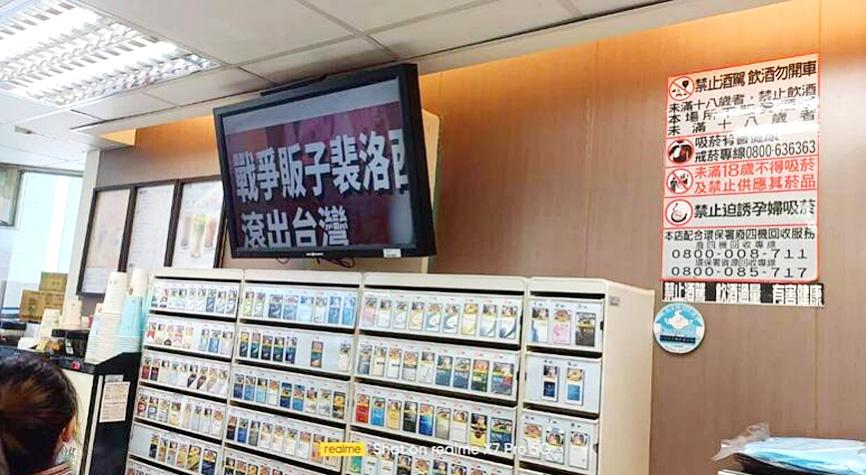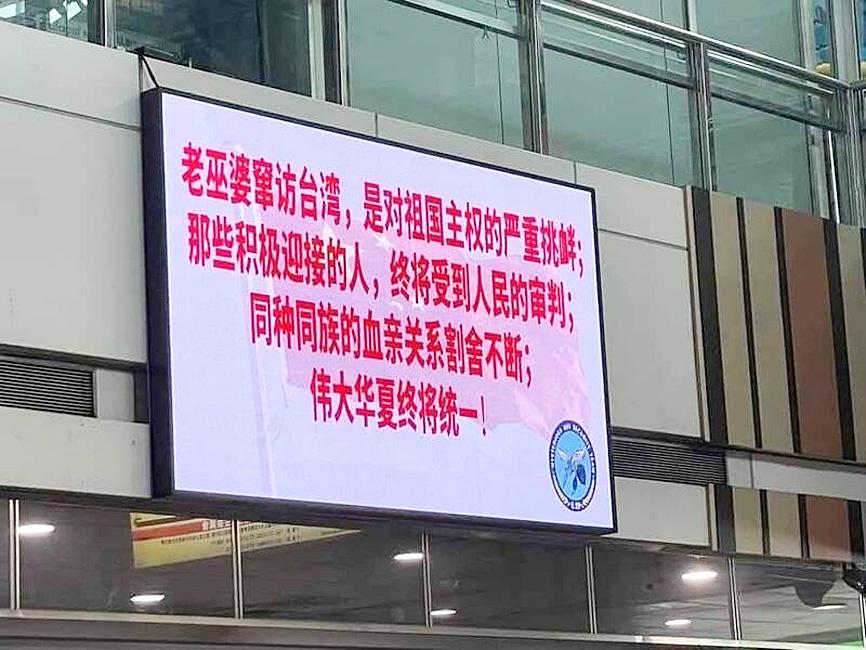Criminal Investigation Bureau (CIB) officials yesterday confirmed that the digital display networks of several 7-Eleven outlets and a Taiwan Railways Administration (TRA) station had been hacked, displaying messages attacking US House of Representatives Speaker Nancy Pelosi.
Pelosi arrived in Taiwan on Tuesday, despite warnings and threats from Beijing, which said it would consider her visit a major provocation.
Digital displays at several 7-Eleven outlets displayed a message in Chinese that read: “Warmonger Pelosi get out of Taiwan,” with an image of her grimacing face.

Photo grab from the Baofei Commune Facebook page
The bureau said the server of the chain stores’ contractor had been hacked.
Democratic Progressive Party Legislator Chao Tien-lin (趙天麟) said it was most likely the handiwork of Chinese hackers, who also targeted Kaohsiung’s New Zuoying Railway Station, whose digital display showed a message in simplified Chinese calling Pelosi an “old witch.”
“This is an attack on Taiwan through cyberwarfare. It is very serious, and we must find ways to block it and take countermeasures,” Chao said.

Photo copied by Cheng-feng, Taipei Times
“Taiwan is facing a hooligan country, and such large-scale hacking could be the initial phase of Chinese military maneuvers,” he added. “It has happened to 7-Eleven stores, which shows that any smart online network operated by the government and private sectors could be disabled and shut down by hackers. Taiwan must deal with this scenario in our military wargames.”
The bureau said that Taipei-based Hsuan Yang Advertising Co, which operates the Taiwan Railways Administration’s signboards, was hacked at about 10am yesterday.
Railway officials said they cut off the signboard’s power quickly, and alerted its contractor to shut down all operating signboards while it worked on the problem.
The TRA said its Web site and database were not compromised as they run on a different network.
Experts said the hacking incident exposed possible problems, such as the likelihood of the contractor having links to China or Chinese funding, or that the TRA did not strictly require compliance with regulations banning the use of China-made hardware and software.
As many devices are linked via Internet-of-Things networks and passwords can be easily hacked, it is concerning that the railway network, a part of the nation’s basic infrastructure, is vulnerable to intrusion by hackers and that other government sites might also be compromised, they said.
Additional reporting by AFP

Taiwan is stepping up plans to create self-sufficient supply chains for combat drones and increase foreign orders from the US to counter China’s numerical superiority, a defense official said on Saturday. Commenting on condition of anonymity, the official said the nation’s armed forces are in agreement with US Admiral Samuel Paparo’s assessment that Taiwan’s military must be prepared to turn the nation’s waters into a “hellscape” for the Chinese People’s Liberation Army (PLA). Paparo, the commander of the US Indo-Pacific Command, reiterated the concept during a Congressional hearing in Washington on Wednesday. He first coined the term in a security conference last

Prosecutors today declined to say who was questioned regarding alleged forgery on petitions to recall Democratic Progressive Party (DPP) legislators, after Chinese-language media earlier reported that members of the Chinese Nationalist Party (KMT) Youth League were brought in for questioning. The Ministry of Justice Investigation Bureau confirmed that two people had been questioned, but did not disclose any further information about the ongoing investigation. KMT Youth League members Lee Hsiao-liang (李孝亮) and Liu Szu-yin (劉思吟) — who are leading the effort to recall DPP caucus chief executive Rosalia Wu (吳思瑤) and Legislator Wu Pei-yi (吳沛憶) — both posted on Facebook saying: “I

The Ministry of Economic Affairs has fined Taobao NT$1.2 million (US$36,912) for advertisements that exceed its approved business scope, requiring the Chinese e-commerce platform to make corrections in the first half of this year or its license may be revoked. Lawmakers have called for stricter enforcement of Chinese e-commerce platforms and measures to prevent China from laundering its goods through Taiwan in response to US President Donald Trump’s heavy tariffs on China. The Legislative Yuan’s Finance Committee met today to discuss policies to prevent China from dumping goods in Taiwan, inviting government agencies to report. Democratic Progressive Party Legislator Kuo Kuo-wen (郭國文) said

Sung Chien-liang (宋建樑), who led efforts to recall Democratic Progressive Party (DPP) Legislator Lee Kun-cheng (李坤城), was released on bail of NT$80,000 today amid outcry over his decision to wear a Nazi armband to questioning the night before. Sung arrived at the New Taipei District Prosecutors’ Office for questioning in a recall petition forgery case last night wearing a red armband bearing a swastika, carrying a copy of Adolf Hitler’s Mein Kampf and giving a Nazi salute. Sung left the building at 1:15am without the armband and covering the book with his coat. Lee said today that this is a serious